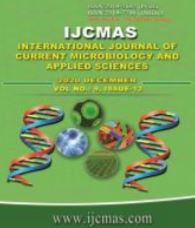


 National Academy of Agricultural Sciences (NAAS)
National Academy of Agricultural Sciences (NAAS)

|
PRINT ISSN : 2319-7692
Online ISSN : 2319-7706 Issues : 12 per year Publisher : Excellent Publishers Email : editorijcmas@gmail.com / submit@ijcmas.com Editor-in-chief: Dr.M.Prakash Index Copernicus ICV 2018: 95.39 NAAS RATING 2020: 5.38 |
Bioremediation of hydrocarbon polluted soil occurs through the utilization of these hydrocarbons as a source of carbon and energy by microorganisms present in the polluted soil, so as to restore and reclaim an environment damaged by these pollutants. The activities of these microorganisms can be enhanced for faster biodegradation by the addition of organic and inorganic nutrients via biostimulation. This research involved laboratory scale bioremediation experiment conducted to compare the effectiveness of three different organic amendments, on the biodegradation of polycyclic aromatic hydrocarbon (PAH) monitored for 28days. The application of agricultural waste materials as a way of biostimulating the indigenous microbiota for the bioremediation of crude oil and hydrocarbon polluted soil was evaluated. The aim of this research is to evaluate the effect of three different organic amendments (fishpond effluent/waste, spent mushroom substrate and compost soil) on polycyclic aromatic hydrocarbon degradation in other to determine the amendment that have the highest biodegradation potential (efficiency). Oil polluted soil samples were collected from an abandoned artisanal crude oil refining site in Ngia-Ama Kiri in Degema Local Government Area, of Rivers State. The organic amendments used for biostimulation were: Fishpond effluent/ waste (FPE), Spent mushroom substrate (SMS) and Compost soil (CS). Bioremediation process was monitored in 4 experimental setups presented as: 1- Control (Natural attenuation), 2- FPE, 3- SMS and 4- CS for 28 days. Ten percent (10%) each of the organic amendments were added to 900g of polluted soil sample in a microcosm experiment while the control had 1000g of polluted soil with no amendment. Samples were taken from each experimental setup and subjected to both microbiological and physiochemical evaluations using standard methods at days 0, 14 and 28. Spread plate method was used to isolate and enumerate Total heterotrophic bacteria (THB) and Hydrocarbon utilizing bacteria. Gas chromatography-flame ionization detector (GC-FID) was used to detect the changes in PAH concentrations of the experimental setups over time. Results obtained were subjected to ANOVA to check for significant difference. Total heterotrophic bacterial counts ranged from 1.3 x 105Cfu/g – 2.3 x 106Cfu/g and Hydrocarbon utilizing bacterial counts ranged from 1.0 x 105Cfu/g – 1.32 x 106Cfu/g. Amendment with FPE had the most significant bioremediation effect with biodegradation efficiency of 87.4% and a half-life of 9.3 days as when compared to the other amendments. Statistics and biodegradation kinetics at p-value < 0.05 showed that, there is a significant difference in the nature and duration of the amendments (biostimulants) applied. Results of this investigation revealed that the different organic wastes used as biostimulating agents had significant biostimulatory effects on PAH degradation as compared to the unamended (control) setup. However, fishpond waste gave the highest biodegradation potential and the least half-life, followed by the spent mushroom substrate. While the least biodegradation potential and highest half-life was observed in the compost setup. Therefore, the use of fish pond effluent may be recommended for use in the bioremediation of polycyclic aromatic hydrocarbon polluted soil.
 |
 |
 |
 |
 |